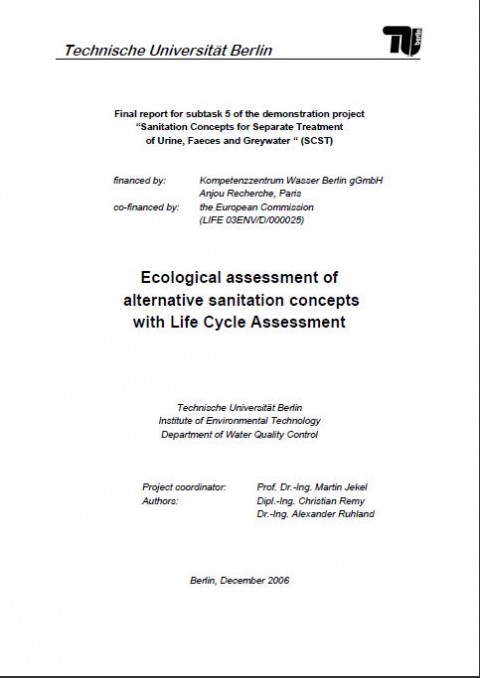Ecological assessment of alternative sanitation concepts with Life Cycle Assessment
Remy, C., Ruhland, A. (2006)

Published in: 2006
Publisher:
Final report for subtask 5 of the demonstration project “Sanitation Concepts for Separate Treatment of Urine, Faeces and Greywater“ (SCST), Technical University Berlin, Germany
Author:
Remy, C., Ruhland, A.
Uploaded by:
SuSanA secretariat
Partner profile:
common upload
4972 Views
86 Downloads
Location of library entry
Content - Summary
The goal of this study is the identification of ecological advantages and disadvantages of alternative sanitation systems in comparison to conventional wastewater treatment. The methodology of Life Cycle Assessment (LCA) is adopted as an evaluation tool for the ecological assessment of various sanitation scenarios for a hypothetical middle-sized settlement in Germany (ca 5000 inhabitants). The scenarios include a reference system with conventional drainage and treatment in an activated sludge plant with anaerobic sludge digestion and sewage gas production. In the alternative scenarios, urine is source-separated in the toilet, collected and applied as fertiliser. Faeces are either collected by gravity drainage and composted together with biowaste or collected by a vacuum system and co-digested with biowaste to gain biogas for energy production. The remaining greywater is treated in a soil filter or in a technical plant (Sequencing batch reactor).
Bibliographic information
Remy, C., Ruhland, A. (2006). Ecological assessment of alternative sanitation concepts with Life Cycle Assessment. Final report for subtask 5 of the demonstration project “Sanitation Concepts for Separate Treatment of Urine, Faeces and Greywater“ (SCST), Technical University Berlin, Germany
Filter tags
English Europe & Central Asia Urban (entire city)















